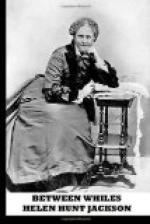“An’ it’s not,” he replied earnestly, almost angrily, with a scornful glance at the flowers. “Ye’ll not be callin’ that heather. Did ye never see true heather, Katie? It’s no more like the stalks ye’ve on yer head than a barrow’s like my boat yonder.”
Which was not true: the flowers were of the very best ever imported into Charlottetown, and were a better representation of heather than most artificial flowers are of the blossoms whose names they bear. Donald was not a judge; and if he had been, it was a cruel thing to say. Katie’s eyes drooped: she had made a serious sacrifice in putting so dear a bunch of flowers on her bonnet,—a bunch that she had, in her own mind, been sure Lady Gownas, of Gownas House, would buy for her summer bonnet. She had made this sacrifice purely to please Donald, and this was what had come of it. Poor Katie! However, nothing could trouble her long to-day, with Donald by her side in the sunny, bright fields; and she would have him to herself till four in the afternoon.
As they drew near the farm-house a strange sound fell on their ears; it was as if a million of beehives were in full blast of buzzing in the air. At the same second both Donald and Katie paused, listening. “What can that be, now?” exclaimed Donald. Before the words had left his lips, Katie cried, “It’s a bee!—Elspie’s spinning-bee.”
The spinning-bees are great fetes among the industrious maidens of Prince Edward Island. After the spring shearings are over, the wool washed and carded and made into rolls, there begin to circulate invitations to spinning-bees at the different farm-houses. Each girl carries her spinning-wheel on her shoulder. By eight o’clock in the morning all are gathered and at work: some of them have walked ten miles or more, and barefoot too, their shoes slung over the shoulder with the wheel. Once arrived, they waste no time. The rolls of wool are piled high in the corners of the rooms, and it is the ambition of each one to spin all she can before dark. At ten o’clock cakes and lemonade are served; at twelve, the dinner,—thick soup, roast meat, vegetables, coffee and tea, and a pudding. All are seated at a long table, and the hostesses serve; at six o’clock comes supper, and then the day’s work is done; after that a little chat or a ramble over the farm, and at eight o’clock all are off for home. No young men, no games, no dances; yet the girls look forward to the bees as their greatest spring pleasures, and no one grudges the time or the strength they take.
It was, indeed, a big bee that Elspie McCloud was having this June morning. Twenty young girls, all in long white aprons, were spinning away as if on a wager when Donald and Katie appeared at the door. The door opened directly into the large room where they were. Katie went first, Donald hanging back behind. “I think I’ll not go in,” he was shamefacedly saying, and halting on the step, when above all the wheel-whirring and yarn-singing came a glad cry,—




